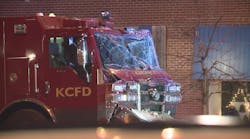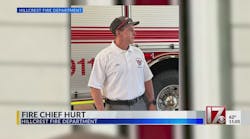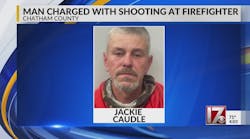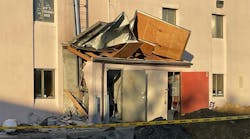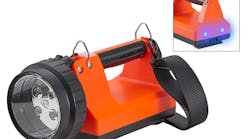We thank Contributing Editors William Goldfeder and Mark McLees for helping compile these reports. We again invite readers to share their experiences. You may send them to Chief Goldfeder at [email protected].
MAINE: Firefighter Down On Rooftop
It was a relatively small job, but a roof vent was still needed. I didn't have a set (access) with my truck because it is a Snorkel and we were in some pretty heavy trees. The first-due ladder had a clear set to the roof of this 31/2-story building. In these cases the roof crew from the second-due ladder will simply go up over the first ladder and make up a two- or three-man team.
This time, I was meeting a firefighter who was already on the end of the aerial and asking me to bring up a roof ladder. We started hand cutting through the slate roof. Things had started to slow down and we had face-to-face contact with the boys in the attic through the hole. Command had reported that some fire was showing on a rake board near the ridge pole. The crew in the attic simply handed us a small line and we scurried across the ridge and played some water on the fire.
It was fairly humid and we were starting to get a bit tired. I told the firefighter that we should get back near the ladder before we took a break, only because once you stop it's hard to get moving again. Just as he approached me, he cried out, "Light-headed, light-Headed!" He fell against me and I was left holding him, and he's my size, 240-250 pounds! I was straddling the ridge pole and he was hanging.
Obviously, I could not free a hand to call for help on the radio. Luckily, a firefighter on another engine happened to see what was going on and came up the ladder. I wear a (non-issued) harness with some life-safety webbing attached. I was able to have the firefighter get the webbing around the member who was passing out, who was now semi-conscious, and loop it through his waist strap on the SCBA - thank God he was wearing his waist strap - and hook it back into the harness that I was wearing.
We now had him secured, but the issue now was getting him off the roof. Getting to the ladder was going to next to impossible due to him being in and out of consciousness. A decision was made to cut another hole in the roof so we could lower him down through. This went off without a hitch. He was brought down through the inside of the building to awaiting paramedics who treated and transported him to the medical center. He was admitted overnight with heat exhaustion and fatigue.
Without this strap, he would have certainly fallen off the roof, and God only knows what the result may have been. For all intents and purposes we all went home (alive) that night, although the steak and potatoes that were left on the plates at the station did not survive the test of time.
The main issues that I can't stress enough are:
- ALWAYS wear the waist strap on the SCBA.
- NEVER go to the roof alone.
- ALWAYS wear some kind of ladder belt or harness.
NEW YORK: Stairs Collapse
I was on an engine at a fire in a tenement. It was heavily involved. We went in and up to second floor. When we tried to go to the third floor, the stairs collapsed. That left two engine companies and a truck company on the landing. Everyone started bailing out as best they could. Some went out a rear fire escape, others out the front fire escape. Myself and another firefighter did not see where everyone went, so we decided to go down the burning rubble of the stairs (I was inexperienced).
We stepped onto the burning rubble, fell onto our backs and our SCBA acted like a toboggan, and we slid down on top of the debris. When they lifted us up at the bottom, our legs were still running and we ran out into the middle of the street.
We did not see our officer or other firefighters, so we got a line, went up the front fire escape and back into the second floor to look for them (smart, huh?). They did not see us and went looking for us. The officer was angry, but we didn't have radios and there was no roll call. (Lesson: Radio communication is CRITICAL and accountability is essential.) We were then sent to the roof of the adjoining building with a hoseline. That was where we discovered we were all hurt with burns and bruises.
Modern-day collapse procedures as well as the strict use of accountability and the incident command system would have helped at that time.
FLORIDA: Following Orders
I was second on the line for a shed fire. We had a new guy with us, kind of cocky, but OK. I decided to let him get on the nozzle for a little practice. The lieutenant was about 10 feet behind me, just looking things over.
The lieutenant gave the order to back out. I didn't question why, but passed the message to the nozzleman and began to pull the line. The nozzleman turned around and said, "I almost got it," and pulled the line back. The lieutenant repeated his order, the nozzleman repeated he almost had it, and then it happened a third time. Each time, I was pulled in a different direction.
Then, on the third exchange, when the nozzleman had his back to the fire to talk back to the lieutenant, there was an explosion. I grabbed the nozzleman and pulled him down and considered both of us lucky not to be blown up. Lesson: Just follow the order!
Everyone does not have to know why an order was given. The fireground is not a democracy, it's a dictatorship. If you feel you're being led into an unsafe environment, there are ways to deal with that, but you don't argue tactics with the officer. It takes MANY eyes to manage the fireground - when you are on the line, you CANNOT see the big picture.
